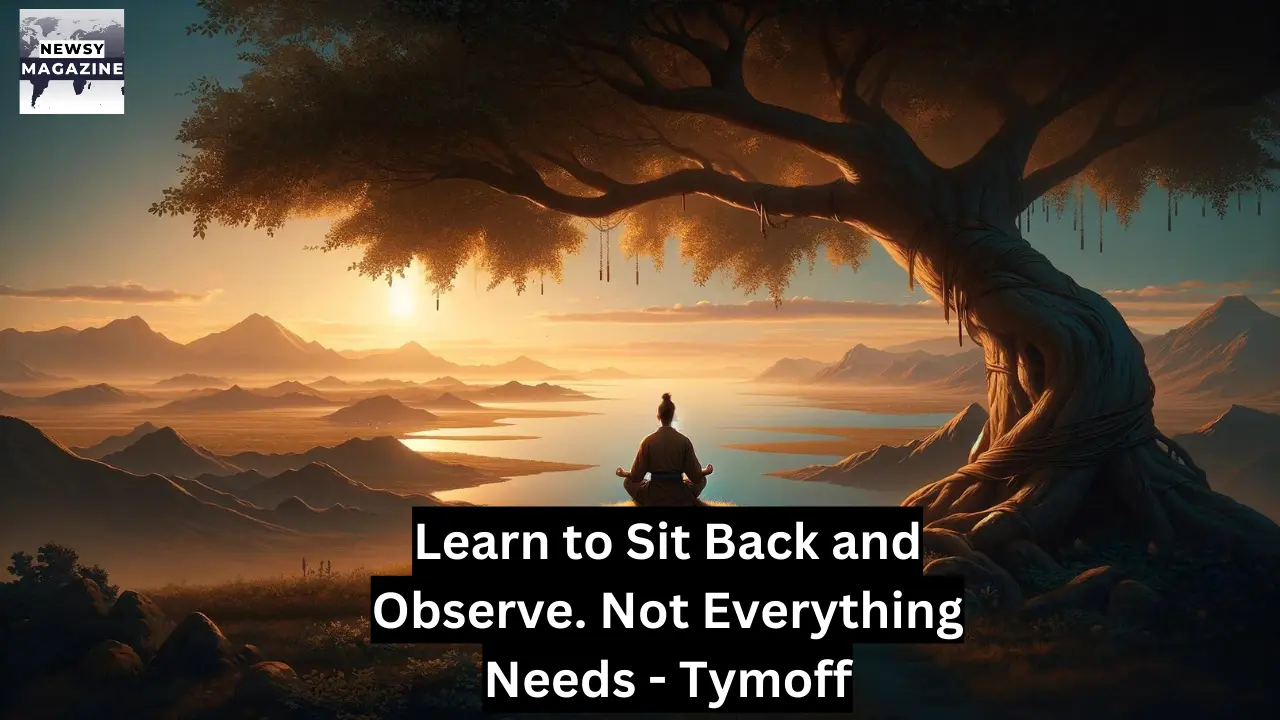
In our fast-paced world, where instant gratification and rapid decisions dominate, the ability to sit back and observe can seem counterintuitive. However, this skill is not about inaction; it’s about cultivating awareness and understanding. “Learn to Sit Back and Observe. Not Everything Needs – Tymoff” a phrase championed by Tymoff, offers profound wisdom for those seeking a balanced and thoughtful approach to life and decision-making.
Why is this approach so crucial? Imagine making decisions with a clear mind, free from the clutter of hasty judgments and emotional reactions. Observing before acting allows us to gather comprehensive information, understand different perspectives, and ultimately make more informed choices. This not only reduces the risk of mistakes but also leads to more effective and harmonious interactions, whether in business or personal relationships.
In this article, we will explore the transformative power of observation. We’ll delve into its psychological and practical benefits, provide actionable insights on developing this skill, and highlight real-life examples where observation has made a significant difference. By embracing this mindset, you can enhance your decision-making, reduce stress, and lead a more fulfilling life. Let’s embark on this journey to uncover the power of sitting back and observing.
The Importance of Observation
Understanding the Value of Observation
Observation is a fundamental skill that plays a crucial role in various aspects of life. It involves paying attention to details, understanding contexts, and interpreting subtle cues. By observing, we gather information that can help us make better decisions and avoid unnecessary mistakes.
For instance, in the business world, leaders who practice observation can identify emerging trends, understand their team’s dynamics, and foresee potential challenges. In personal relationships, observing non-verbal cues can help in understanding emotions and fostering better communication.
The Psychological Benefits
From a psychological perspective, taking time to observe can reduce stress and improve mental clarity. When we’re constantly reacting without pause, our minds become cluttered, leading to anxiety and burnout. Observation allows us to slow down, process information, and approach situations with a calm and clear mind.
Mindfulness practices, which emphasize observation and awareness, have been shown to improve mental health by reducing symptoms of depression and anxiety. By incorporating observation into our daily routine, we can enhance our overall well-being and resilience.
How to Develop the Skill of Observation
Practicing Mindfulness
Mindfulness is a powerful tool for developing observational skills. It involves paying attention to the present moment without judgment. Simple mindfulness practices, such as mindful breathing or body scanning, can enhance our ability to observe our surroundings and internal states.
Start by setting aside a few minutes each day to practice mindfulness. Focus on your breath, observe your thoughts without getting caught up in them, and gradually extend this practice to your daily activities. Over time, you’ll notice an improvement in your observational skills and overall awareness.
Journaling Your Observations
Another effective method to enhance observation is through journaling. By recording your observations, you can reflect on them and gain deeper insights. Journaling helps in consolidating information, identifying patterns, and understanding your reactions to various situations.
Make it a habit to jot down your observations at the end of each day. Note down significant events, interactions, and your emotional responses. Reviewing these entries regularly can provide valuable insights into your behavior and help you make more informed decisions.
The Role of Observation in Decision-Making
Gathering Information
One of the key benefits of observation is the ability to gather comprehensive information before making decisions. Rushing into decisions without adequate information can lead to mistakes and regrets. By observing, we can collect data, understand different perspectives, and weigh our options carefully.
Consider the example of a manager deciding on a new business strategy. By observing market trends, competitor actions, and internal capabilities, the manager can make a well-informed decision that aligns with the company’s goals and resources.
Avoiding Knee-Jerk Reactions
In many situations, our initial reactions are influenced by emotions and biases. Observation helps us avoid these knee-jerk reactions by giving us time to process information and consider alternative viewpoints. This leads to more rational and balanced decisions.
For instance, in conflict situations, taking a moment to observe the dynamics and emotions involved can prevent escalation and lead to more constructive resolutions. By observing before reacting, we can handle conflicts with empathy and understanding.
Real-Life Examples of Effective Observation
Business Leaders
Successful business leaders often attribute their achievements to the ability to observe and adapt. Leaders like Warren Buffett and Jeff Bezos emphasize the importance of observation in understanding market trends, customer needs, and competitive landscapes. By observing and analyzing these factors, they make strategic decisions that drive their companies forward.
Warren Buffett, known for his patient investment strategy, often spends significant time observing and analyzing companies before making investment decisions. This careful observation allows him to identify undervalued stocks and make profitable investments.
Personal Growth
On a personal level, observation can lead to significant growth and self-improvement. By observing our habits, reactions, and interactions, we can identify areas for improvement and work towards becoming better versions of ourselves.
For example, someone looking to improve their public speaking skills can benefit greatly from observing experienced speakers. By noting their body language, tone, and engagement techniques, they can incorporate these observations into their practice and enhance their skills.
Practical Tips to Enhance Observation Skills
Active Listening
Active listening is a crucial component of effective observation. It involves fully concentrating on what is being said, rather than passively hearing the words. Active listening helps in understanding the speaker’s perspective, emotions, and intentions.
To practice active listening, focus on the speaker without interrupting, acknowledge their points through nodding or brief verbal affirmations, and ask clarifying questions if needed. This not only improves your observational skills but also fosters better communication and relationships.
Observing Body Language
Body language can reveal a lot about a person’s feelings and intentions. By paying attention to non-verbal cues such as facial expressions, gestures, and posture, we can gain deeper insights into their emotions and thoughts.
For example, crossed arms might indicate defensiveness, while leaning forward can show interest and engagement. By honing our ability to read body language, we can navigate social interactions more effectively and respond appropriately.
Challenges in Cultivating Observation
Overcoming Distractions
In today’s digital age, distractions are ubiquitous. Constant notifications, social media, and multitasking can hinder our ability to observe effectively. To cultivate observation skills, it’s essential to minimize these distractions and create a conducive environment for focused observation.
Set aside specific times for observation without digital interruptions. Engage in activities that promote concentration, such as reading, nature walks, or meditation. Creating a distraction-free environment can significantly enhance your observational capabilities.
Patience and Consistency
Developing strong observational skills requires patience and consistency. It’s a gradual process that involves continuous practice and reflection. Many people give up too soon, expecting immediate results. However, the benefits of observation become apparent over time with persistent effort.
Set realistic goals and be patient with yourself. Celebrate small improvements and stay committed to the practice. Consistency is key to mastering the art of observation.
Read Also: It Is Not Wisdom But Authority That Makes A Law. T – Tymoff
Conclusion
Learning to sit back and observe is a powerful skill that can enrich various aspects of our lives. It enables us to gather valuable information, make informed decisions, and build better relationships. By practicing mindfulness, journaling, active listening, and observing body language, we can enhance our observational skills and lead more fulfilling lives.
In a world that often glorifies constant action, embracing the wisdom of observation can set us apart. It allows us to navigate challenges with clarity, avoid unnecessary mistakes, and achieve our goals with greater efficiency. Let’s make a conscious effort to slow down, observe, and appreciate the subtle details that shape our experiences. In doing so, we unlock the true potential of mindful observation and pave the way for personal and professional growth.
FAQs
What are the main benefits of sitting back and observing?
Sitting back and observing allows us to gather comprehensive information, make informed decisions, reduce stress, and enhance our mental clarity. It also helps in understanding others better and fostering stronger relationships.
How can I practice mindfulness to improve my observational skills?
Start by dedicating a few minutes each day to mindfulness practices such as mindful breathing or body scanning. Gradually incorporate mindfulness into daily activities and focus on the present moment without judgment.
What is the role of journaling in enhancing observation?
Journaling helps in recording and reflecting on observations, identifying patterns, and gaining deeper insights. Regular journaling can improve self-awareness and decision-making skills.
How does active listening contribute to effective observation?
Active listening involves fully concentrating on the speaker, understanding their perspective, and acknowledging their points. It improves observational skills by enhancing our ability to interpret verbal and non-verbal cues.
Why is observing body language important?
Observing body language provides insights into a person’s emotions and intentions. It helps in understanding non-verbal cues and navigating social interactions more effectively.
By embracing the practice of sitting back and observing, we can unlock a wealth of benefits that lead to personal growth and improved decision-making. Let’s cultivate this valuable skill and enjoy the profound impact it can have on our lives.






